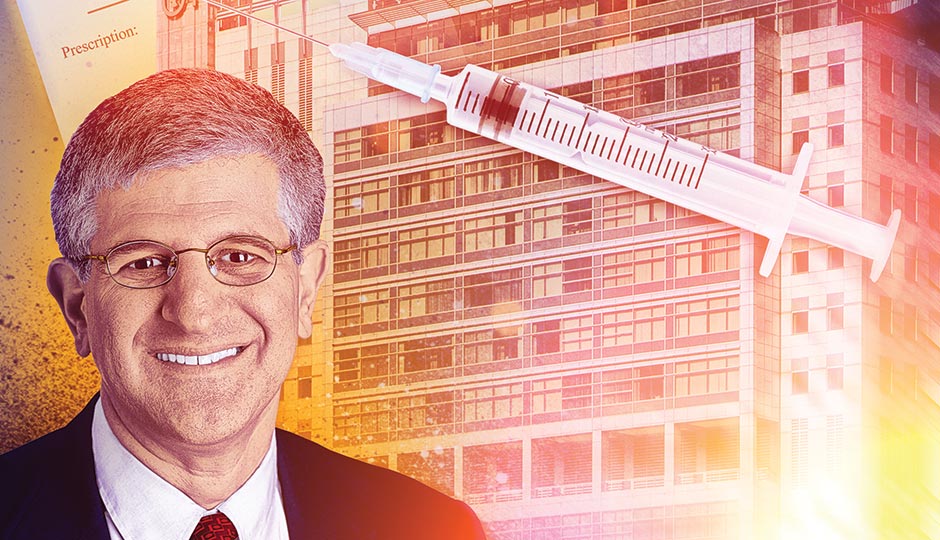Paul Offit’s Measles Crusade

Illustration by Gluekit
If you look at a bar graph of measles outbreaks in the United States since 2001, you’ll see a startling and ominous trend: After years of very few cases of the highly contagious — and sometimes deadly — virus, the number spiked exponentially in 2014 to a 20-year high of 644. With the recent measles outbreak at Disneyland, which has affected more than 120 people in 17 states, we’re on track to top that this year, which has Children’s Hospital of Philadelphia doctor Paul Offit in a quiet rage.
Offit, 63, has been waging war against anti-vaccine zealots for decades, and measles sits at the center of that battle. Before the measles vaccine was introduced in 1963, there were more than three million cases each year. And measles is no laughing matter; the complications can be fatal, especially in babies. But after generation upon generation of us got vaccination shots, measles was effectively eradicated. Like polio.
“It’s an amazing success story,” says Offit.
Then something changed.
In the early 1980s, a study suggested that the vaccine for whooping cough — another highly contagious illness that can prove especially dangerous for infants — might cause brain damage. The fear of that vaccine spread to other vaccines as well, and parents began opting out of shots for their kids. Some formed a national group, Dissatisfied Parents Together (today it’s known as the National Vaccine Information Center), and the modern anti-vaccination movement was born.
You know what happened next, of course: That study was debunked, and people started getting the measles again. In large numbers.
Philadelphia wasn’t immune. As Offit details in his latest book, Bad Faith, released this month, the city was the site of a measles epidemic in the early ’90s. Two churches whose congregants rejected vaccinations were at the center of the outbreak. By the summer of 1991, 1,400 people were infected. Five children died in less than two weeks.
It was, as the city’s deputy health commissioner described it, a “nightmare.” The Centers for Disease Control were brought in, and a temporary compulsory measles vaccination program was implemented to squelch the virus’s spread.
“We’re the only place in U.S. history that has had compulsory vaccinations,” Offit explains. “Mandatory vaccination means you have to get a vaccination or you can’t get a job or go to school. With compulsory vaccinations, you’re pinned down whether you want it or not. Not even the ACLU complained.”
The anti-vaccination movement got a boost again in the late ’90s when a British study showed that the measles vaccine could cause autism in children. That study was later shown to be downright fraudulent, but that didn’t stop misinformed parents from accepting it as fact, helped along by the Internet and celebrities like Jenny McCarthy, who has blamed her son’s autism on the vaccine.
Here in Philadelphia, and in the entire state, all children are supposed to be vaccinated before entering school. But — and this is a very big but — a parent can get a legal exemption simply by writing a letter and declaring a religious objection or “a strong moral or ethical conviction.” Statewide, approximately one-quarter of children don’t have their full battery of shots.
Offit’s wife Bonnie, a local pediatrician, says that not a day goes by without parents refusing a vaccination for one of her patients. It sometimes happens more than once a day. That’s a whole lot of drooling, sneezing kids running around with potential germ bombs, which is particularly dangerous around infants, who typically don’t get the measles vaccine until they’re one. Think about that the next time you take your kid to the airport.
Offit believes that if the measles problem gets worse — and he’s certain it will — legislators might clamp down on the anti-vaccination contingent. “If a child dies of measles in this latest outbreak, that could change the conversation as far as the ethical objections go,” he says. “But religious exemptions will generally be untouched.”
And that’s why he’s written Bad Faith. Offit isn’t a religious man, but in his research for the book, he studied the Bible to try to understand the religious basis for refusing vaccines.
“I just don’t get it,” he says. “These are profoundly unreligious acts. The more I read the Bible, the more I read about how Jesus was a guy that stood up for children. How can you, in his name, let children suffer and die?”
Originally published as “The Man Against Measles” in the March 2015 issue of Philadelphia magazine.


